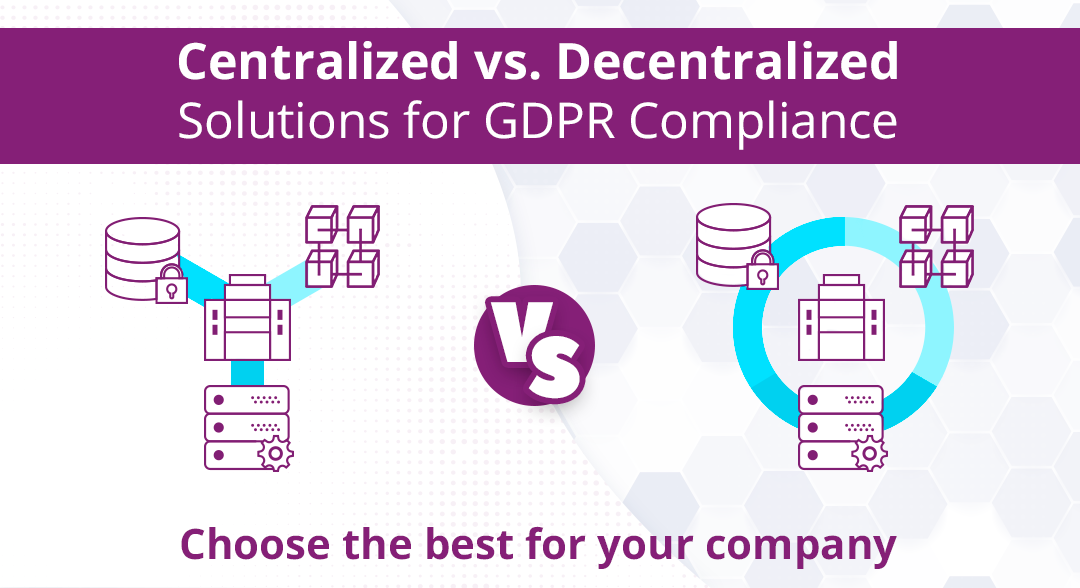GDPR is a new law that changes operation in companies, which collect, store or interact with user data. The regulation consists of 99 articles with a detailed description of new rules, applying to companies with business operations in еру European Union.
One of the reasons behind the GDPR’s initialization was the increase in unethical usage of information across companies and countries. It was issued to protect personal information and ensure it is used lawfully. For non-compliance, the document entails a fine of up to 20 million Euros or up to 4% of the annual turnover.
Companies all over the world are searching for an ultimate solution that could help to store user data and protect it from hacker attacks. Software R&D companies offer a range of solutions to be used to become GDPR compliant. Centralized and decentralized applications serve the same purpose; however, they differ in a few critical fields.

The pros and cons of centralized solutions
Storage of data in at the core of everything that GDPR regulates. Many companies have to rely on centralized databases to store information about customers. At first, such solutions can be an ideal and cost effective-choice for a small business. But as the company grows it needs to broaden infrastructure and add extra servers to ensure all operations run soothingly. As a result, scaling of the system can become a main spending pattern. And let’s not forget about bottlenecks that occur as a result of high traffics.
The vast majority of companies uses centralized solutions. Designing a centralized database is not very difficult, and many IT companies provide services for their development. You can easily find a contractor who will be responsible for the development and maintenance of a system. The competition in the market is high, so the cost of the work is relatively low.
However, there is always a “but.” The underlying idea of centralized databases is that only one database is kept at a single location on a given network. Usually there is minimal or no data redundancy, so if data is lost it is almost impossible to retrieve it and it has to be done manually.
Centralized databases are exposed to the risk of breaches and data leaks. Usually, the data configuration is so weak that it is easy to exploit. Very often it is even not necessary to use sophisticated hacking methods due to the initially totally insecure database. Even with a protection system in place, violators can use brute-force to crack weak or default usernames and passwords, target unpatched database vulnerabilities, apply SQL injection or steal backup records. The result of malicious actions may be a personal identification by the stored data, which is a major breach of the law in accordance to GDPR.
With a poorly protected database, a business can’t guarantee the security of user data. GDPR is very strict about data protection, and a chance of data breaches puts companies at risk. Even if a company complies with regulations, one successful hacker attack could cost millions of Euros and put a business in danger.
Blockchain-based decentralized solutions with security at the core
Decentralized solutions are a more reliable and secure method of interaction with user data. If centralized storage uses a single unit to store data, decentralized storage stores information on multiple physical locations that makes data restoration possible. And when we add blockchain to the equation, we get highly secure storage for any data, including the data of your users and customers.
The anonymity of users and data protection lie at the root of both GDPR and blockchain. The latter is designed to be intensely private and equally secure. The public and private keys allow participants to send and receive data with nearly absolute anonymity. The public key is detached from any person and information is hashed, thus can’t be used to identify the real person behind the scenes, making blockchain compliant with the regulations.
Increase in security is another advantage you should consider. The very nature of blockchain removes a single point of vulnerability. Data is stored on many nodes that are distributed all over the world, and it is the distributed network without single point of failure. Companies that use information from blockchain don’t have to operate with the threat of data leak. The chance of such an occurrence is minimized if not null at all.
Almost infinite scalability is one of the main advantages blockchain-based solutions possess. If using a centralized database you need to buy new servers, with blockchain you don’t have to spend money on their purchase and maintenance. As a result, it reduces the price of the services for your company.

Different blockchain companies provide tools to create your own blockchain solutions. You only have to hire qualified specialists and pay for transactions, though the price of them may be lower than the price of centralized storage maintenance. Moreover, it mitigates the risk of breaches that can result in multi-million penalties.
Emercoin is also working on a solution to help companies become compliant with GDPR. Blockchain provides more reliable solutions for data collection, storage and security as it follows the principles of “privacy by design” introduces by General Data Protection Regulation.